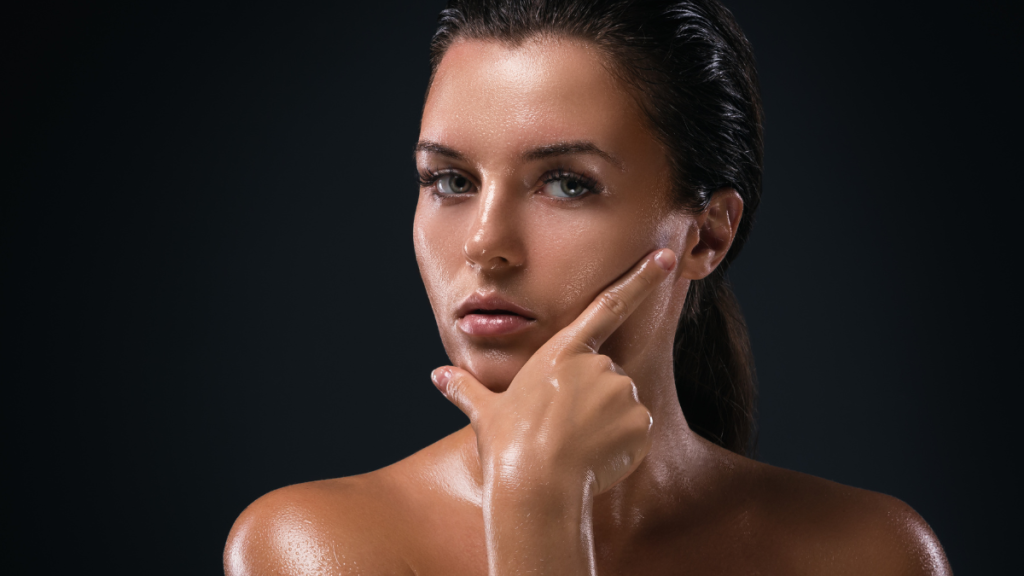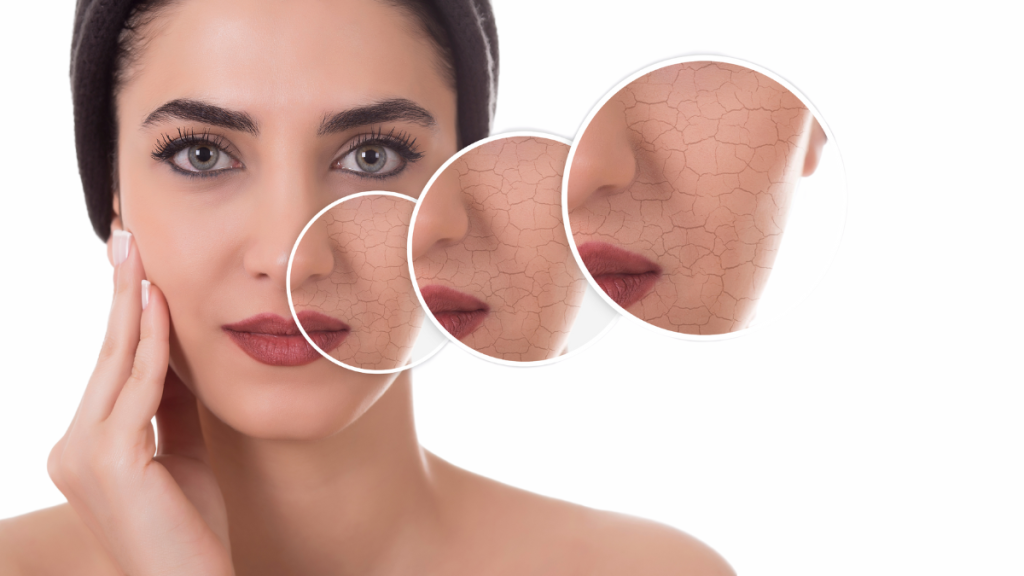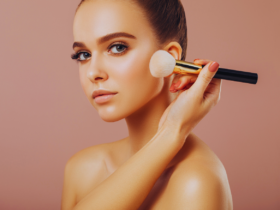We all want to achieve the perfect complexion but it is essential to determine your skin type in order to care for it correctly. Determining it is not always easy, because whether it is of one type or another depends on genetics in most cases, however, it can always vary according to other external factors, such as age or constant exposure to the sun.
Using sunscreen should be an essential step in your beauty routine, also always clean your face with a cotton pad and cold water to remove dead cells and remember to use beauty products such as essential oils, facial oils, micellar water, facial creams, moisturizers or toners are not always the best option for your face.

If you didn’t know, skin can be classified into five groups: normal, dry, oily or combination, and also sensitive, which reacts easily to external agents. Here’s how you can determine your skin type:
Normal skin
You can identify it by being in complete balance. For example, it is soft to the touch, it does not have blemishes, it is not too greasy, it is not very dry, and the pores are small or hardly visible. This means that it is hydrated and that it is healthy skin, however, you should not stop taking care of it, because over time it could change its type.
How do I determine normal skin type?
- Fine pores.
- Good blood circulation.
- Velvety, soft and smooth texture.
- Uniform transparency of pink, fresh color.
- Absence of impurities.
Oily skin

Sebum is one of the characteristics of oily skin that commonly occurs while facing hormonal changes. It is secreted in excess when you have many sebaceous glands and you can even experience this type of skin from consuming certain drugs and cosmetics. You may notice a lot of blackheads and pimples, your face is shiny all the time, your pores are very visible, and the texture is uneven and uneven. There are those who suffer from acne and you can notice this type of impurity in other parts of the body such as the back, neck, chest and shoulders. The skin becomes red and inflamed.
How do I determine oily skin type?
- Greasiness all over the face
- Enlarged pores
- Breakouts or rashes
- The skin is thicker
- Irregular texture
- Light oily layer when touching the face
Dry Skin
As a curious fact, women suffer more from dry skin than men. It is very common for the skin to become dehydrated and lose moisture through perspiration. Also, being tense and stressed, physical activities and heat make your face feel rough and your skin look dull. There are even those who experience spots or irritation.

How do I determine dry skin type?
- Little elasticity
- Tightness
- Rough touch
- Premature wrinkles on thin skin
- Dull appearance
Combination skin
Believe it or not, this is the most common type, combination skin is identified when oily parts of the face alternate with others that are dry and dehydrated. You can identify it if the T zone (nose, forehead and chin) is shiny and the cheeks and temples are dry and rough. In addition, the pores dilate and you can get imperfections.
How do I determine combination skin type?
- Dry cheeks
- Shiny and fat in the T zone
- Open pores in the same area
- Appearance of pimples and blackheads
Sensitive skin
This is one of the most common and complex skin types, so we recommend you go to a specialist, he will give you the best advice, facial care and beauty tips for skin care if you have signs such as redness, irritation, burning , itching, or even if you present symptoms or spontaneous injuries due to the weather. You must apply the correct beauty products or cosmetics to avoid accelerating premature aging signs.
What care should you have?
It is important that you cleanse your skin thoroughly before applying facial care products. Use lukewarm water instead of very hot or very cold water. Always use products gel and oil free products for oily or mixed skin that help not to increase the sebaceous stimulus, hydrating and thick products for dry skin. Apply a moisturizer regularly special for your skin type, it is enough to use an amount the size of a hazelnut. Consider a toner to tighten pores and prevent blemishes. It is not recommended that you use products with high levels of alcohol, since these also dehydrate the skin.
Our skin also changes
The skin type is determined at birth and typically remains the same throughout life. There are some factors, nevertheless, that will have an impact and change it.
The director of Integral Dermatology explains: “when we are born our skin is very thin and permeable to many substances or the sun’s rays. Furthermore, the defenses of the dermis have not fully developed.” Adolescence is marked by hormonal changes, during which many adolescents have acne, which can be alleviated with good hygiene and consulting a specialist if necessary.
In adulthood, the skin continues to change, generating some confusion about its status. In fact, people who have oily skin when young, dry it out with age, although acne often continues at any age with occasional outbreaks. Contrarily, dry skin throughout adolescence is more likely to be severely dry, flake off, and wrinkle quickly. It is therefore a good idea to switch cosmetic products.
Additionally, a number of variables can affect potential skin changes. There are two types of factors: one endogenous , the main cause of which is genetics, which produces a reduction in secretions from the sebaceous and sweat glands, another external factor, such as ultraviolet rays, diet, pollution, stress, or lack of sleep; and another endogenous factor, such as the degeneration of elastic fibers or the onset of atopic dermatitis.
Tell us, could you determine your skin type? Do you already use suitable products for your skin type?
Absolutely! Skin types can change over time due to factors like aging, hormonal changes, and variations in climate or lifestyle. It’s not unusual to need different skincare as you grow older.
A simple way is the ‘bare-faced test.’ Cleanse your face, pat it dry, and leave it bare (no products) for an hour. After this, examine your cheeks, chin, nose, and forehead for any shine (indicating oiliness) or tightness (suggesting dryness).
Definitely. Your skin may produce more oil in hot, humid weather and become drier in cold, windy conditions. It’s important to adapt your skincare routine accordingly.
Understanding your skin type helps in choosing the right skincare products. Using the wrong products can exacerbate skin issues like dryness or oiliness.
Yes, dermatologists can conduct assessments like the Fitzpatrick skin typing test or use tools like sebum meters to measure oil production. These methods provide a more detailed understanding of your skin.
It’s a good idea to reassess your skin type every few years or whenever you notice changes in your skin. This ensures your skincare routine remains effective.
Yes, indeed! What you eat and your lifestyle choices can have a significant impact on your skin. For instance, a diet high in sugars and fats might lead to more oily skin, while dehydration can make your skin appear drier. Also, stress and lack of sleep can affect your skin’s health and appearance.
Different skin types age differently. Oily skin, for example, may show signs of aging like wrinkles later than dry skin, as the oil helps to keep skin moist and plump. However, oily skin might be more prone to age-related changes like enlarged pores or age spots.
Definitely. Allergies can cause your skin to react in various ways, potentially leading to redness, itching, or even changes in oil production. It’s important to identify any allergens and adjust your skincare routine accordingly.
Yes, over-cleansing can strip the skin of its natural oils, leading to dryness or irritation. Conversely, it can also trigger more oil production as your skin tries to compensate for the loss. It’s crucial to use a gentle cleanser and not overdo it.









2 Comments